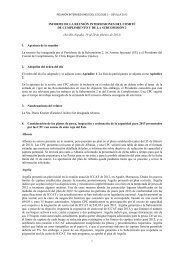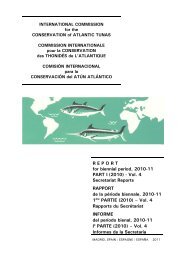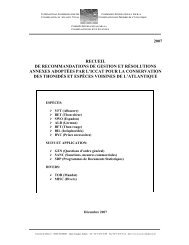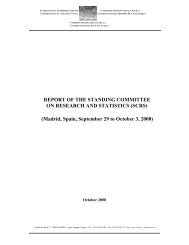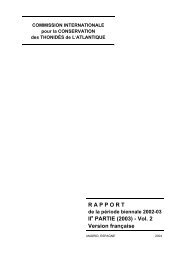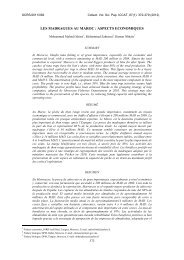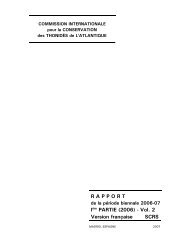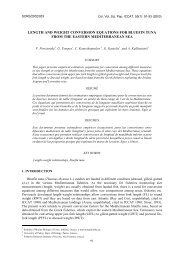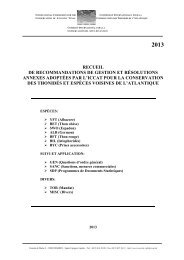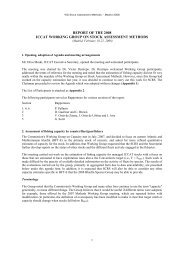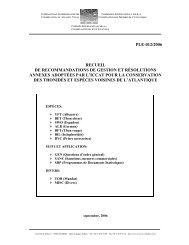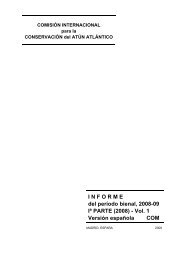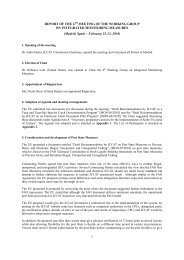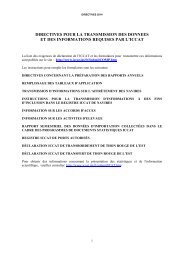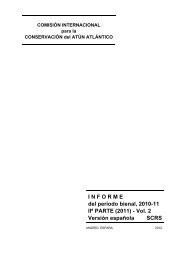E - Iccat
E - Iccat
E - Iccat
Create successful ePaper yourself
Turn your PDF publications into a flip-book with our unique Google optimized e-Paper software.
ICCAT REPORT 2012-2013 (I)<br />
118<br />
Proposal to the Third Meeting of the Working Group on the Future of ICCAT<br />
(Submitted by the United States)<br />
Appendix 4 to ANNEX 4.2<br />
ICCAT Resolution 11-25 directed the Working Group on the Future of ICCAT to “discuss concrete proposals to<br />
address the priority issues identified during the first two meetings of the Working Group on the Future of ICCAT<br />
with a view to making recommendations to the Commission at the 18th Special Meeting to achieve progress on<br />
strengthening ICCAT.”<br />
The United States believes that targeted amendments to certain Convention articles are necessary to address fully<br />
many of the priority issues identified in the Future of ICCAT process and to ensure the efficient and effective<br />
functioning of ICCAT in the long run. With that in mind and pursuant to Resolution 11-25, the United States<br />
would like to offer proposals on some of the priority issues that will be considered by the working group during<br />
its May 2012 meeting. This initial contribution focuses on needed changes to the ICCAT Convention in the<br />
following five key areas: (1) the precautionary approach; (2) ecosystem considerations and Convention scope;<br />
(3) decision-making processes; (4) non-party participation; and (5) monitoring, control and surveillance (MCS)<br />
measures. In addition, given the nature of some of our suggestions, we first touch on a possible addition to the<br />
structure of the Convention that would help incorporate and put into context these and potentially other priority<br />
issues.<br />
In this submission, the United States has not fully addressed all the priority issues identified by the working<br />
group in its first two meetings. The United States remains very interested, however, in working with other parties<br />
on ways to address all of the issues to be considered in May.<br />
Convention objective, principles, and approaches. To help address the five areas covered in this proposal and<br />
potentially other issues highlighted previously in the Future of ICCAT process, the Commission should consider<br />
amending the Convention to include clearly articulated Convention objectives and to outline guiding principles<br />
and approaches to decision-making. Principles and approaches such as the ecosystem approach to management,<br />
the precautionary approach, science-based management, transparency, capacity building and assistance, effective<br />
MCS measures and potentially others, are key to good fisheries management and should be reflected in the<br />
ICCAT Convention. ICCAT has incorporated some of these elements in its operations and decision-making<br />
through conservation and management recommendations adopted under Article VIII of the Convention.<br />
However, many of these important concepts are noticeably absent from the Convention itself. ICCAT needs to<br />
enshrine these guiding principles and approaches in its Convention to provide the strongest foundation possible<br />
to support its operations and decisions. Articles outlining the Commission’s overarching objective and guiding<br />
principles and approaches could be accomplished by:<br />
♦ Redrafting the preamble to become an operative article outlining the overarching objective, which may be<br />
the appropriate place to reflect the concepts of maximum sustainable yield or long-term conservation and<br />
sustainable use;<br />
♦ Adding an article that sets forth concepts and approaches to guide the work of the Commission,<br />
including, at a minimum:<br />
◦ Decisions should be based on the best available science and should reflect the precautionary approach;<br />
◦ Decisions should reflect the ecosystem-based approach to fisheries management;<br />
◦ Decisions should be made in a fair and transparent manner;<br />
◦ Decisions should take into account the needs and special circumstances of developing coastal States;<br />
and<br />
◦ Decisions should take into account allocation criteria as developed by the Commission.<br />
The Precautionary Approach. The ICCAT Convention must more clearly reflect the central role of sciencebased<br />
management and the application of the precautionary approach with respect to the species under its<br />
purview. A core aspect of these concepts is that States should be more cautious when information is uncertain<br />
unreliable, or inadequate and that the absence of adequate scientific information shall not be used as a reason for<br />
postponing or failing to take conservation and management measures. Recent actions taken by the Commission<br />
to help ensure its decisions are based on the best available science and implement the precautionary approach are<br />
welcome advancements; however, we believe that these will not address the matter in its entirety and into the<br />
future. These concepts should also be central, guiding tenets in the ICCAT Convention.



